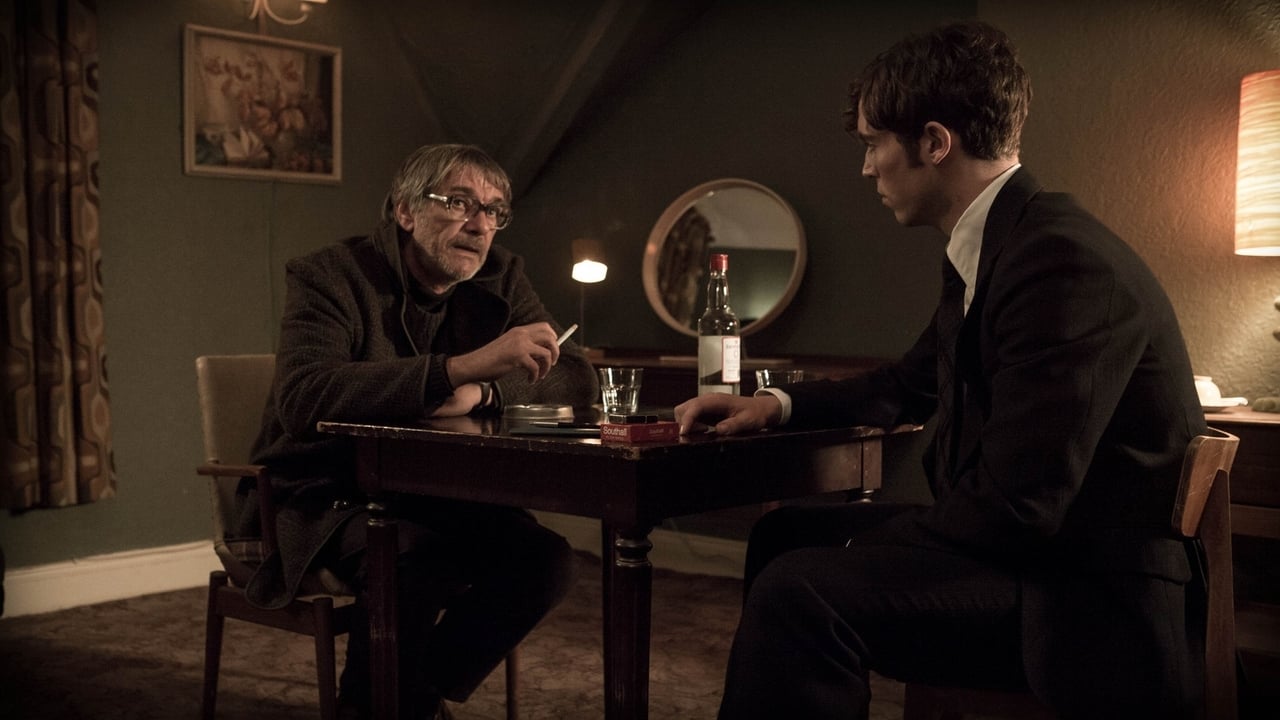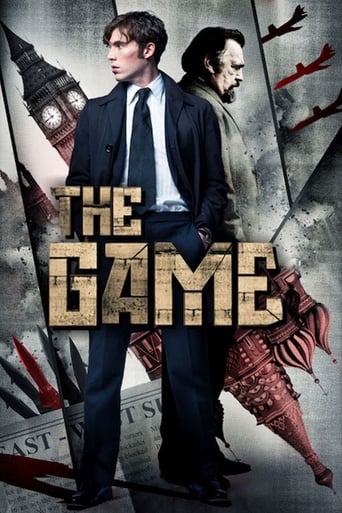



Excellent, smart action film.
Best movie ever!
A bit overrated, but still an amazing film
Ok... Let's be honest. It cannot be the best movie but is quite enjoyable. The movie has the potential to develop a great plot for future movies
View MoreIt seems as though the Cold War spy thriller is making something of a come back in recent years. The last few years have seen a spate of new adaptations of the classic Cold War era works of author John le Carre ranging from the Oscar nominated film adaptation of Tinker Tailor Soldier Spy to a slew of BBC audio drama adaptations of the various novels. Authors such as Charles Cumming in his novel The Trinity Six have also explored the legacy of the Cold War as well. Yet there's also been new tales told as well, pastiches of a thought dead genre. One particularly interesting one was the BBC's six part thriller The Game, created by Toby Whithouse, which took viewers into MI5 in early 1970s Britain.The premise of the series is simple enough. It's 1972 and Britain is the throes of a miners strike, power cuts, and a general sense of unease. Into this world, a KGB Colonel approaches MI5 with word that a major Soviet operation called Operation Glass is about to take place. An operation so major that it will redefine the history of British-Soviet espionage. Investigating Operation Glass are a number of MI5 operatives and brass from field agent Joe (Tom Hughes), counter-espionage boss Bobby (Paul Ritter), his deputy Sarah (Victoria Hamilton), her electronic surveillance expert husband Alan (Jonathan Aris), rising secretary Wendy (Chloe Pirrie), and Special Branch officer Jim Fenchurch (Shaun Dooley) with the agency director known only by the code-name "Daddy" (Brian Cox) sitting at the top.Whithouse, along with writers Sarah Dollard and Debbie O'Malley for some of the middle episodes, certainly know the genre they are playing with. As well as the mysterious Operation Glass, it becomes apparent quickly that there is a mole within MI5 (potentially within their own little group) which threatens to expose the investigation. There are shades of the le Carre classic Tinker Tailor Soldier Spy as well as other notable Cold War thrillers such as Fredrick Forsyth's The Fourth Protocol. Indeed it would be easy to simply call The Game a potential rip-off of le Carre but that is to give only a superficial glance at the series. For Whithouse injects into familiar le Carre tropes other elements of Cold War spy fiction, putting them out in the field alongside them as it were. There's fears of Soviet infiltration of the British establishment (a very real worry in the post-Cambridge spies era), nuclear secrets, the inter-service rivalry between the domestic focused MI5 and the foreign-focused MI6 which all come into play. More than that, the series does a nice job of creating a sense of time and place by tying into larger issues of the early 1970s including IRA bombings and the state of British politics, which gives this fictional take on the era an air of verisimilitude. Combined with the characters and often strong guest casts, it's a compelling 21st-century take on the Cold War spy thriller.That sense of time and place is something apparent in the production values as well. The sense of pastiche comes across especially in the visuals of the series, especially as the series seems to harken back at times to the aforementioned 2011 film version of Tinker Tailor Soldier Spy. From the interior of MI5 to the way people are dressed, there are strong echoes of that film here. More than that, the direction of Niall MacCormick and Daniel O'Hara drives that point home. So too does the cinematography of Sam McCurdy and Urszula Pontikos with its washed out colors that bring to mind the dreariness one often associates with the decade in the UK. How much of this is a deliberate echo of director Tomas Alfredson and cinematographer Hoyte van Hoytema's work on that film is unclear as it might be down to both the film and TV series being set in the same time period but using that as a visual shorthand certainly helps the series in setting its tone. When composer Daniel Pemberton's score is added, especially when his haunting opening theme is paired with a very well opening title sequence, it helps bring to life Whithouse's vision rather nicely.The Game then stands a Cold War spy thriller made in the present day. It nicely echoes elements of the genre's classic such as Tinker Tailor Soldier Spy while also finding new things to do as well by tying into the wider world of early 1970s Britain, allowing it to be more than just a pastiche of a bygone genre. In the process, it becomes a compelling, twisty piece of work that rewards viewers willing to watch the entire series.If you can, of course, trust what you're watching. After all, in the espionage world, things are so rarely what they seem. The Game certainly proves that to be the case.
View MoreI thought this series was a great show and want to know when or if you are making another. I enjoyed watching how the characters were built and unfolded and trying to work out who was what (baddie or goodie) in the characters. Also enjoyed the slower pace of the story as opposed to one and a half hour movies that squeeze as much out of the time as possible without portraying the 'real life' pace and how in 'real life' it is the bringing together of lots of small pieces of information that result in collating the whole picture/story. Hope you make another one.
View MoreThe premise is this: a Soviet agent holed up as a university professor in England gets called up for a major operation that consists in waking up sleeper cells in numbers for an unstated grievous purpose. He defects and spills the beans to the MI5. The MI5 - represented, for the most part, by the love-child of Morrissey and a flock of cats (Tom Hughes) - expects the worst and stands up to the challenge, monitoring the operation in desperate hope that they may get one step ahead of the Russians. Needless to say, with 6 hour-long episodes, it's easier said than done. All this takes place in the bleak environs of early-1970s London, in cramped spaces, dilapidated housing, and persistent rain (reminiscent of "Se7en"). The series is well-made and entertaining. The pace - initially somewhat pedestrian - quickens by the 4th episode to get you panting by the 5th. At first, the drama seems very facile - seeming to boil down to a personal duel between Tom Hughes's "Joe Lambe" and a KGB killer on the loose in England. But there's enough of side story to this to keep you thinking there's more to it than that. And, frankly, you do get rewarded. On the technical side, the editing is near-perfect and the acting is pretty good, too. I was stuck on Victoria Hamilton' performance in "Mansfield Park," but she's a completely different thing here, with enormous self-assurance and power. Brian Cox is also a perfect hit as the head of MI5 ("Daddy"). If anything, it's Hughes that seems rather odd - his appearance and demeanor is somewhat out of place. On the one hand, this may be a virtue, since he does portray a far less bleak character than it initially appears. On the other hand, he's anachronistic - a poster-boy for the new romantic or a candidate for a remake of "Anna Karenina." The portrayal of "the game" resonates with all that an avid reader of le Carre will know - that it's almost never fun and games, and that it's not about the spectacular at all. The "games" we see played out in the series are not just about espionage - they are also about the personal lives of the characters who either play or get played. While it's not on level with the classic le Carre stuff with Alec Guinness, there's enough substance here to make you hope there's more to come from this source. This is really good enough to see.
View MoreOne part 'Tinker, Tailor', and one part 'Spooks', moody thriller 'The Game' tells the story of an attempt by the British government (in a thinly fictionalised 1970s) to spoil a major Soviet intelligence operation. There's the possibility of at least one mole, office politics, and a brooding air of tension amid general social decay. But what made John Le Carre's story so brilliant was its minimalism: not one thing happened that wasn't necessary for the plot. 'The Game' needs too many set pieces and seems to present an intelligence agency repeatedly guilty of both bizarre judgement and operational incompetence. The love story woven into the story has its own tragic conclusion; but none of the subtlety of George Smiley's complicated, broken relationship with Ann. Tom Hughes is underpowered in the lead role; the supporting cast, however, at least play their (somewhat stereotyped) parts with gusto.
View More